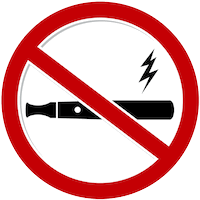No, seriously, please make the fear-mongering stop.
It has been a heck of a week in the e-cig industry. Laws in New York and Chicago are now in effect, making electronic cigarettes subject to the same regulations as tobacco. These bans, alongside recent bans in Chicago and Los Angeles, and the highly publicized federal regulations proposed last week, are keeping public health officials, and the e-cigarette industry on edge.
What’s the Deal with E-Cig Fear-Mongering?

Alright, we understand that a certain amount of caution is justified. Whenever a new product comes along and takes off like wildfire, it’s often difficult to keep up with companies, marketing and the like. In turn, when a product comes along accompanied by misguided promises, medical claims and more, poor communication can create a fervor of panic and overreaction.
Yet, there is still little definitive research that demonstrates the health and safety risks from vaping, or from inhaling someone else’s vapor. On the other hand, of the vapor studies that are out there, the majority point to secondhand vapor being far less dangerous than secondhand, and even thirdhand, smoke.
Related: Secondhand Vapor vs. Secondhand Smoke
How Should E-Cigs Be Regulated?

So, should cities treat e-cigarette vapor the same as secondhand smoke from tobacco products, even though there’s no evidence that it’s dangerous?
If the purpose of these bans is to protect non-vapers from being forced to inhale “dangerous substances” against their will, then government agencies should be prudent and gather the evidence they need to properly implement these regulations.
But, in the absence of further information, it seems like just a touch of overkill to enforce a vaping ban outdoors where vapor dissipates quickly. Before restricting a personal liberty like puffing on an e-cigarette at a park, or on the street, there should at least be some proof that the activity could potentially harm others – however slight it may be.
And that proof isn’t even close to being there.
Creating Public Health Policies Based on Fear
There’s an understandable human “need” to come down hard on e-cigarettes for fear of potential health impacts. But this urgency is rarely supported by concrete proof and verifiable evidence. It seems the people most adamantly against e-cig use are the ones least educated about their ingredients or how they work. It’s human nature to fear what we don’t know. But fear isn’t a good reason for regulation.






